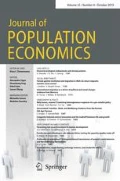Abstract
A husband and wife, though benefitting from marriage, may yet misappropriate some of the spouse's assets rather than let all be saved. In a Nash equilibrium, family savings may therefore be lower than what each spouse would prefer. Social Security, which is a form of forced, secure saving, can therefore increase welfare.
Similar content being viewed by others
References
Alessie R, Kapteyn A, Klijn F (1997) Mandatory pensions and personal savings in the Netherlands. De Economist 145(3):291–324
Amato PR, Rogers ST (1997) A longitudinal study of marital problems and subsequent divorce. J Marriage Fam 59(3):612–624
Becker GS (1981) A treatise on the family. Harvard University Press, Cambridge
Bernheim D, Skinner J, Weinberg S (1997) What accounts for the variation in retirement wealth among U.S. households? Working Paper No. 6227, National Bureau of Economic Research
Bolin K, Pålsson AM (2000) Male and female wealth: the importance of the family structure. Working paper, Department of Economics, Lund University
Browning M (2000) The saving behaviour of a two-person household. Scand J Econ 102(2):235–251
Diamond PA (1977) A framework for social security analysis. J Public Econ 8(3):275–298
Diamond PA, Hausman J (1984) Individual retirement and savings behavior. J Public Econ 23(1–2):81–114
Dicks-Mireaux L, King M (1984) Pension wealth and household savings: tests of robustness. J Public Econ 23(1–2):115–139
Feldstein M (1974) Social security, induced retirement, and aggregate capital accumulation. J Polit Econ 82(5):905–926
Galasso V, Profeta P (2002) The political economy of social security: a survey. Eur J Polit Econ 18(1):1–29
Konrad KA, Lommerud KE (2000) The bargaining family revisited. Can J Econ 33(2):471–487
Konrad KA, Olsen T, Schöb R (1994) Resource extraction and the threat of possible expropriation: the role of Swiss Bank accounts. J Environ Econ Manage 26(2):149–162
Kreps DM, Milgrom P, Roberts J, Wilson R (1982) Rational cooperation in the finitely repeated prisoners’ dilemma. J Econ Theory 27(2):245–252
Laibson DI (1997) Golden eggs and hyperbolic discounting. Q J Econ 112(2):443–477
Laitner J (1988) Bequests, gifts, and social security. Rev Econ Stud 55(2):275–299
Lundberg S, Pollak RA (2001) Efficiency in marriage. Rev Econ Househ 1(3):153–167
Lundberg S, Ward-Batts J (2002) Saving for retirement: household bargaining and household net worth. Michigan Retirement Research Center Working Paper 00–04
Lundberg S, Startz R, Stillman S (2003) The retirement-consumption puzzle: a marital bargaining approach. J Public Econ 87(5–6):1199–1218
Mulligan CB, Sala-i-Martin X (1999a) Social security in theory and practice (I): facts and political theories. Working Paper No. 7118, National Bureau of Economic Research
Mulligan CB, Xavier Sala-i-Martin X (1999b) Social security in theory and practice (II): efficiency theories, narrative theories, and implications for reform. Working Paper No. 7119, National Bureau of Economic Research
Neyman A (1985) Bounded complexity justifies cooperation in the finitely repeated prisoner’s dilemma. Econ Lett 19(3):227–229
Venti SF, Wise DA (2000) Choice, chance and wealth dispersion at retirement. Working Paper No. 7521, National Bureau of Economic Research
Author information
Authors and Affiliations
Corresponding author
Additional information
Responsible editor: Alessandro Cigno
Rights and permissions
About this article
Cite this article
Glazer, A. Social security and conflict within the family. J Popul Econ 21, 331–338 (2008). https://doi.org/10.1007/s00148-006-0118-3
Received:
Accepted:
Published:
Issue Date:
DOI: https://doi.org/10.1007/s00148-006-0118-3




